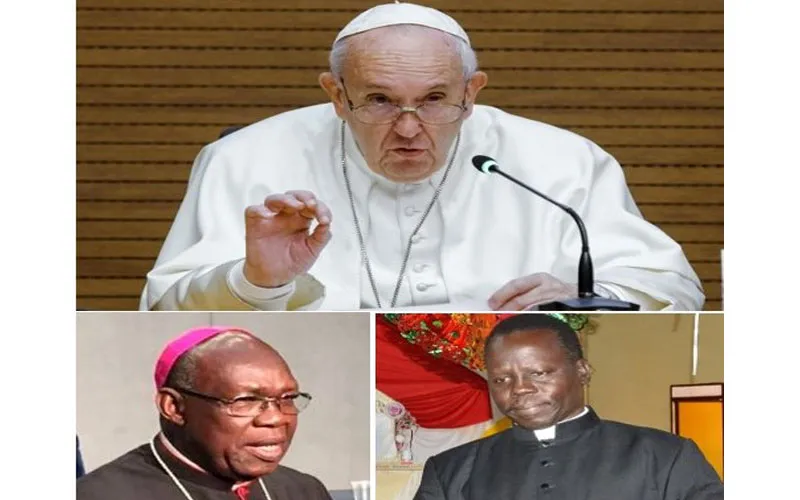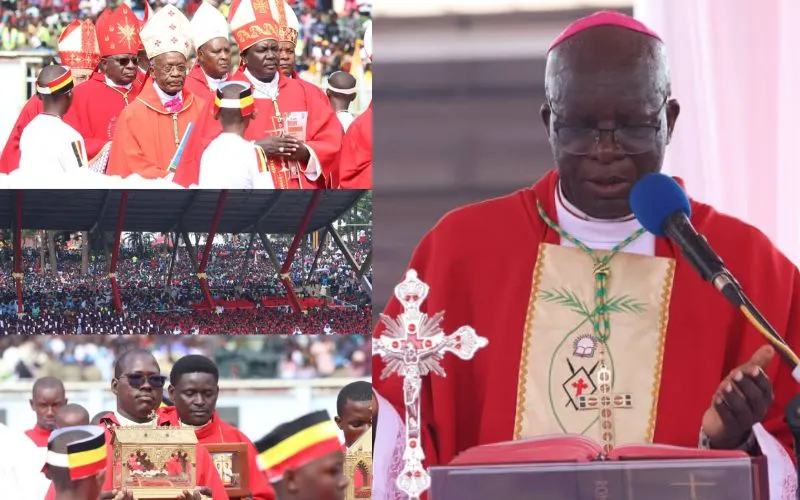At the March 6 Press Conference, the Propaganda Fide Delegate, Msgr. Kulbokas told journalists that “the Holy Father was informed of what were the allegations and what were the answers of persons who were presenting the allegations during the investigative process and the Holy Father recognized that the evaluating process was done in a correct way and he confirmed Archbishop Stephen Ameyu as Archbishop of Juba.”
“It means that the Holy Father considered that those serious allegations have no grounds,” Msgr. Kulbokas said during the March 6 Press Conference at the Apostolic Nunciature of South Sudan in Juba.
Commenting on the findings of the Vatican-led investigation into accusations leveled against the Archbishop-elect including claims of having concubines and half a dozen biological children, the Archbishop emeritus said, “I do not know about the weaknesses of Bishop Ameyu.”
He added, “I think most of these allegations were brought by ladies and the ladies smell better than men. They know the situation on the ground better than men. I tell you very clearly, my experience of 37 years as bishop of Juba, priests make mistakes … I have not been CID to be going around my priests but when things are brought to me by women that this priest is like this, I believe.”
Recounting his engagement with the Vatican on some of the allegations against his successor, Archbishop Lukudu focused on the protest letter signed by some 42 women.
(Story continues below)
“When I was asked by the Vatican people here, I said look, I do not know, but part of more than 40 women saying that it is like this, it is like this, I tell you Vatican, I (tend) to believe because I have the experiences of the women in Juba, they tell me the truth,” the Comboni Missionary Prelate told journalists during the Press Conference in Juba.
According to Archbishop Lukudu, the protest letters are an expression of the people’s dissatisfaction about Pope Francis’ choice of his successor and thinks that the “voice” of the natives of Juba, including his own, is being ignored by the Vatican.
“These people are talking, talking. I have written a lot of letters to the Vatican about this issue, the difficulties I meet. The people on the ground here, some chiefs, some intellectuals have also written, women have written, but what is the point?” he posed, adding, “I think, so far that the Vatican is not very clear about this (Archbishop-elect’s issue), therefore it is the voice of the laity and I personally do not know about it.”
When the first set of protest letters surfaced last December, the Sudan Conference of Catholic Bishops that brings together Bishops and heads of dioceses in Sudan and South Sudan convened a meeting in Juba and issued a collective statement.
The December 19 statement, which did not bear the signature of Archbishop Lukudu alongside his Auxiliary Bishop, Santo Loku Pio Doggale even though both were in attendance, indicated that the Bishops in the two-nation conference “support unreservedly” the decision of Holy Father to appoint Bishop Ameyu as the new Archbishop of Juba.
“We, the Sudan and South Sudan Catholic Bishops’ Conference, celebrate with Catholics and all the people of Juba and the nation, that there is now a new Catholic Archbishop,” the statement read in part.
“We acknowledge the decision of the Holy Father of accepting the resignation of Archbishop Paolino Lukudu, allowing him to take a well-deserved and long overdue rest, and appointing his successor, Most Reverend Stephen Ameyu Mulla as the Archbishop of Juba,” the Bishops had stated in their collective statement.
The statement went on to expresses SCBC members’ “heartfelt thanks to the Holy Father” for the transfer of Bishop Ameyu to Juba and that they “welcome the new Archbishop with full support unreservedly.”
During this week’s Press Conference, the Archbishop emeritus expressed his awareness of the latest protests against the Archbishop elect.
Referencing the Sunday, March 8 attack, Archbishop Lukudu said, “I went to Kator midday to see what is going on, (only) to find the soldiers, the sisters and the fathers closed inside. The keys of certain offices were not there, they did not eat lunch on Sunday, and supper, because the kitchen was closed. I asked who closed? They did not know. Some priests ran away.”
He highlighted the need to strive to be “good” pastoral agents saying, “I believe, you need good priests, not bad priests, you need good Bishops who try; there is nobody who is an angel in this world; all of us are sinners, and yet we want to be good. That is what we have to do, we have to be good.”
Archbishop Lukudu, however, warned a section of priests in the Archdiocese of Juba who, he said, were poisoning the laity amid the back-and-forth protests.
“I would not wish that some of our priests are misbehaving with the laity. They are bringing down all these kinds of things and poisoning the laity,” he said, adding, “Now at this moment we have got a problem which is tribal (as well as) political. These things we must avoid,” he said.
He also divulged on advising the Vatican not to hasten “things” in the country which he said was already struggling to attain peace.
“I was advising the Vatican that in our country South Sudan, we have a big problem that we are still solving. Now we have come to ten states, good, but it is not yet smooth, we have not yet reached the peace that we are looking for. If we add again this problem of the Church, we are in trouble, we do not know how to go about it,” he told journalists and added, “The advice to the Church in Rome was to let us go slowly until we put things in order.”
Referencing Pope Francis expected visit to the country, he said, “It is being said that in 2022, the Pope has decided to come to Juba. I think this is too heavy, and we have been warning our Vatican diplomats to let us go slowly.
The retired Archbishop said he has had talks with an official of the Vatican who he describes as “coming as the last messenger from the Vatican” and “the man who wrote the letter that was read in the Church talking about the coming of Bishop Ameyu to Juba on 22nd”
“I suggested to him (the Vatican official), to meet a small group of priests to tell them that this is what I brought from the Vatican so that they are clear about it that this is not the voice from Juba, is the voice from the Vatican. Secondly, since you come from the Vatican, meet also a group of laity so that you tell them that this is the voice from the Vatican,” he said, lamenting that the Vatican official ignored his advice.
He added, “This man said he was going back to Rome, to the Pope and present him the situation. What is the Pope going to say? You Ameyu go ahead, or you wait or what?”
Archbishop Lukudu told journalists that he is waiting for communication from Rome, through the Vatican delegate, to know the way out of the existing stalemate.
“The issue is going back now to the Pope and we wait to see what to do,” the Archbishop emeritus said.
This notwithstanding, in the latest four-page protest letter, the signatories revealed that Archbishop Lukudu was expected at the Vatican by Saturday, March 14.
“We cannot understand how Msgr. Kulbokas can be delegated by the Congregation for the Evangelization of Peoples when the Prefect of the same Congregation, His Eminence, Luis Antonio Cardinal TAGLE, has just asked the Apostolic Administrator of Juba to go to Rome, on 14th March 2020, to “look into issues that arose regarding the recent appointment of the Archbishop of Juba, the Most Reverend Stephen Ameyu,” the protesters probed in their March 8 press statement.








